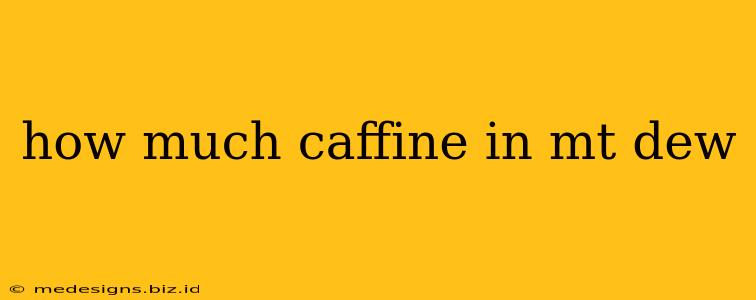Mountain Dew, the iconic citrus-flavored soda, is known for its bold taste and vibrant energy. But how much caffeine does it actually contain? This guide will delve into the caffeine content of Mountain Dew, exploring different varieties and comparing it to other popular beverages.
Caffeine Content in Different Mountain Dew Variations
The caffeine content in Mountain Dew can vary slightly depending on the specific product and serving size. However, a general guideline is helpful:
-
Standard Mountain Dew (12 oz can): Typically contains around 54 mg of caffeine. This is a significant amount, especially compared to some other soft drinks.
-
Other Mountain Dew Flavors: While the core caffeine content remains relatively consistent across most flavors (like Code Red, Voltage, etc.), it's always best to check the nutrition label of the specific product you're consuming for precise information. Minor variations might exist.
Comparing Mountain Dew Caffeine to Other Drinks
To put the caffeine content of Mountain Dew into perspective, let's compare it to other popular caffeinated beverages:
| Beverage | Caffeine (mg/12oz) |
|---|---|
| Mountain Dew | ~54 |
| Coca-Cola | ~34 |
| Pepsi | ~38 |
| Starbucks Coffee (Grande) | Varies greatly depending on the drink |
| Red Bull (8.4 oz) | ~80 |
As you can see, Mountain Dew sits firmly in the middle range of caffeinated drinks. It contains considerably more caffeine than Coca-Cola or Pepsi, but less than a typical serving of coffee or energy drinks like Red Bull.
Understanding Caffeine's Effects on Your Body
Caffeine is a stimulant that affects the central nervous system. While moderate consumption is generally considered safe for most adults, excessive caffeine can lead to various side effects, such as:
- Anxiety and nervousness: Increased heart rate and jitters.
- Insomnia: Difficulty falling asleep or staying asleep.
- Headaches: Both caffeine withdrawal headaches and headaches triggered by excessive consumption.
- Upset stomach: Caffeine can stimulate the digestive system, leading to discomfort.
It's crucial to be mindful of your caffeine intake and consider your personal tolerance. If you're sensitive to caffeine, you may want to limit your consumption of Mountain Dew or opt for decaffeinated alternatives.
Tips for Managing Your Caffeine Intake
- Check the label: Always read the nutrition facts to know the exact caffeine content.
- Moderate consumption: Avoid overdoing it. Spread out your consumption throughout the day.
- Listen to your body: Pay attention to how caffeine makes you feel. If you experience negative side effects, reduce your intake.
- Hydration: Drink plenty of water to stay hydrated, especially when consuming caffeinated beverages.
- Alternative options: Explore caffeine-free alternatives if you're concerned about caffeine's effects.
In conclusion, Mountain Dew contains a moderate amount of caffeine, significantly more than some other sodas, but less than many energy drinks or coffee. Knowing the caffeine content and understanding its potential effects is vital for making informed choices about your consumption. Remember to always check the nutrition label on your specific Mountain Dew product for the most accurate information.
